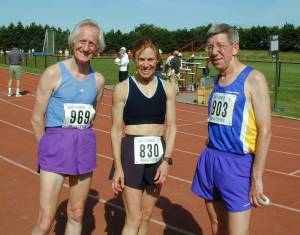
Whitlock fell on ice last November and broke a rib, one month after lowering his 80+ marathon world record to 3:15:54. He missed months of training and didn't resume his famed routine of daily two- to three-hour runs in a nearby cemetery until mid-summer.
"I have had injury issues all this year and I am not in 100% shape," Whitlock wrote this morning to Runner's World Newswire. "I was relieved to beat the half record as I thought it would be touch and go considering my less than optimum training. The course was flat and weather conditions were very good, little wind and low temperatures."
Next up for Whitlock is the half or marathon at October 14's Toronto Marathon, held about 45 minutes from Whitlock's home.
"I am not 100% sure whether I will do the half or the full but I am leaning towards the full," Whitlock wrote. "My expectations for the marathon are not too high as there's not much time to improve my condition before then.
"Still training in the cemetery, haven't come to my senses yet," Whitlock added.
Any discussion of Ed Whitlock must start with the graveyard. The Milton Evergreen Cemetery is a typical Victorian take on the topic, a public space with roads and landscaping providing a small urban oasis. The grid pattern of the roads allows several permutations of loops. Towering trees line both sides of some roads. It's easy to imagine 19th-century families heeding the call of that time to picnic and linger on the grounds. Today, the modern world of Toronto exurb sprawl has encroached. The roar of nearby Highway 401 and an even nearer Walmart plaza are constant, except when they're drowned out by the whine of a leaf blower or one of the frequent prop planes passing over.

Whitlock lives two and a half blocks from the cemetery, and does all of his training there. Speed work, daily maintenance runs, long runs of up to 3 hours, everything, meted out in loops that take no more than 5 minutes. He leaves his house with his day's assignment decided and runs loops until his time is up. He doesn't count loops or time them. He does look at his watch frequently and thinks, "What is taking so damn long?" The day's loop varies occasionally, sometimes dictated by the presence of grounds crew or gravediggers. He never runs the full perimeter loop. The last little section on the southwestern side of the cemetery would add another minute or so, but it includes a rise, perhaps 50 yards long, with the steepness of a handicap-accessibility ramp. "I choose not to tackle this hill," Whitlock explains. "I don't like hills."
When at the height of marathon training, Whitlock does cemetery loops for 3 hours a day, every day. He doesn't do pick-ups or progression runs or marathon-pace work. He doesn't even stop for water. Just 3 hours a day of what he calls "plodding" or "jogging."
When Whitlock was half that age, he thought his competitive days were behind him. He ran a 4:31 mile in high school in his native England and once beat future world record-holder Gordon Pirie in a cross country race. But an Achilles problem that's with him to this day cut short his university running career. At the age of 21 his mining engineering degree led him to northern Ontario, Canada. "There was no racing scene up there," Whitlock says, "and with my running the way it was there was no way I was going to be a pioneer." While Whitlock appreciated the beauty of the area, "I run to race," he says. "I don't do it primarily for my health or anything else." Running was done.
Of course, all great runners have good genes. What are the Whitlock secrets? There have to be secrets, right?

Only that there are no secrets. "I'm always willing to say what I do," Whitlock says, "but I don't know that it would work for any particular person. Everybody has to find out what works for them."
Interested in finding out if the Whitlock way works for you? Here's what you do: "I do what not to do to an extreme," Whitlock says. "I go out jogging. It's not fast running, just that I do it for a long time. I don't follow what typical coaches say about serious runners. No physios, ice baths, massages, tempo runs, heart rate monitors. I have no strong objection to any of that, but I'm not sufficiently organized or ambitious to do all the things you're supposed to do if you're serious. The more time you spend fiddlediddling with this and that, the less time there is to run or waste time in other ways."

No hay comentarios:
Publicar un comentario